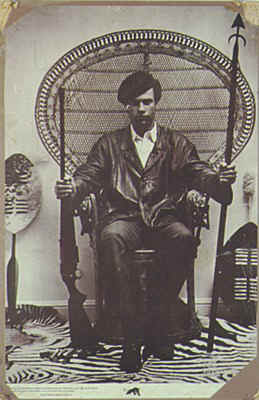Huey Newton was one of the founding members of the Black Panther movement that radicalised the civil rights campaign in America. The FBI was to label Newton and his colleagues in the Black Panthers as ‘Public Enemy Number One’.
 |
Huey Newton was born on February 17th, 1942, in Monroe, Louisiana. In 1945, the family moved to Oakland, California, in an effort to take advantage of job opportunities there. The area around Oakland had seen industrial growth as a result of the requirements for World War Two. However, the racism that would have existed in Louisiana at the time the family lived there was not changed for harmony in Oakland, where the family also experienced racism, though possibly not as overtly as in Louisiana.
Newton found school difficult as he felt that he was made to be ashamed of his colour. He frequently got into trouble with school authorities and was suspended on a number of occasions.
| “All they (the teachers) did was to try to rob me of the sense of my own uniqueness and worth, and in the process they nearly killed my urge to inquire.” (Newton) |
Newton left high school barely literate but wanted to prove to those who classed him as a failure, that they were wrong. He taught himself to read by studying poetry and he went to college where he gained an Associate of Arts degree. Newton also studied law at Oakland City College and at the San Francisco Law School.
However, to finance his studies, Newton took to burglary – something he had also done as a teenager. When he was 22, he was arrested and found guilty of assault with a deadly weapon. He received a six-month jail sentence in a county jail. He spent most of this time in solitary confinement.
While at Oakland City College, Newton became politicised. He read the writings of Mao Zedong, Ché Guevara and Malcolm X. With no party around Oakland to represent the black community there, Newton, along with Bobby Seale, started the Black Panther Party for Self-Defence in October 1966, which would represent the black community. Better known just as the Black Panthers, the organisation became organised and militant. The chairman was Seale and Newton was the ‘minister of defence’.
The Black Panthers first targeted the police of Oakland. They believed that the police had a history of harassing the black community of the city and they decided to police the police to ensure that the black community got a fair deal from them. The Constitution gave American citizens the “right to be arms” and this is exactly what the Black Panthers did.
Newton, along with Seale, wrote the ’Black Panther Party Platform and Program’ which laid out what the Black Panthers wanted – full employment for the black American community, full civil rights, good housing, good educational facilities etc. It was how these desires were to be achieved that worried the authorities. The FBI infiltrated the movement and provided Hoover, the head of the FBI, with intelligence reports regarding the violent intentions of the Black Panthers. In October 1967, Newton was accused of murdering an Oakland police officer – John Frey. In the following year (September 1968) he was convicted of voluntary manslaughter and sentenced to two to fifteen years in prison. In May 1970, this sentence was overturned and a new trial for Newton was ordered. After two more trials, the case against Newton was dropped. There were legal technicalities to this such as the judge failing to provide the jury with proper instructions, but to those in the Black Panther movement the final acquittal seemed to justify their belief that the system was against them and that the accusation against Newton had been a fraud all along, with higher powers attempting to frame him so that the movement would falter without one of its leaders and lose any credibility it had within the black community.
After his release from prison, Newton changed the direction of the movement. While Newton was in prison, membership of the Black Panthers had declined and the FBI had done a great deal to tarnish its reputation. Newton targeted community issues within the black community that he felt needed addressing. The movement provided free breakfasts for children, provided free shoes and sponsored a school.
However, controversy continued to follow Newton. In 1974, he was accused of murdering a 17-year old prostitute, Kathleen Smith. He failed to turn up in court and jumped bail. For three years he lived in Cuba but returned to America in 1977 to face a murder charge. Newton believed that the climate had changed in America and that he was more likely to get a fair trial. After two trials, he was acquitted Smith’s murder.
In 1978, Newton studied for a Ph.D at the University of California. By now the violent activism of the Black Panthers had lessened. But controversy was never far away. In 1985, Newton was arrested for stealing federal and state money that had been paid into the Black Panther’s community education and nutrition fund. In 1989, he faced the same charge of embezzlement from the funds of a school set-up by the Black Panthers. It is said that Newton did this to fund his alcohol and drug addictions.
On August 22nd, 1989, Huey Newton, aged 47, was shot dead, apparently by a drug dealer in a drug deal that went wrong.